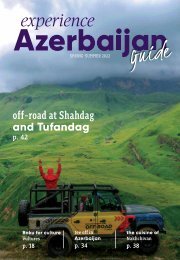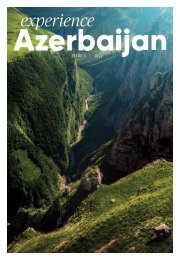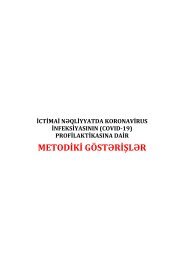JEWISH_EN
You also want an ePaper? Increase the reach of your titles
YUMPU automatically turns print PDFs into web optimized ePapers that Google loves.
Azerbaijan_Reveal Lens Artwork_Jewish
salam<br />
hello<br />
SECTION<br />
Heading<br />
Subheading<br />
Content<br />
Salam/Hello 1<br />
Jewish heritage in Azerbaijan 2<br />
People & history 4<br />
Jewish heritage in Baku 6<br />
Great experiences in Baku 8<br />
Jewish heritage in Guba 10<br />
Great experiences in Guba 12<br />
Jewish heritage in Oghuz 14<br />
Places to visit near Oghuz 15<br />
Useful information 16<br />
Welcome to Azerbaijan, a country situated along the former<br />
Silk Road with deep traditions of hospitality, tolerance and<br />
multiculturalism – traditions so brilliantly illustrated by the<br />
story of the country’s Jewish community. Come discover a rare<br />
land where Jews have always felt at home.<br />
1
<strong>JEWISH</strong> HERITAGE IN AZERBAIJAN<br />
MAP OF AZERBAIJAN<br />
tolerant nation<br />
cultural fusion<br />
Zaqatala<br />
Qakh<br />
Oghuz<br />
Red Village<br />
Located at the crossroads of cultures<br />
and continents, Azerbaijan has attracted<br />
a multitude of tribes and peoples since<br />
ancient times.<br />
While some simply passed through along the Silk<br />
Road, others stayed and settled, and even today<br />
more than 20 national minorities live in peace<br />
in Azerbaijan. Among them are Jews, who have<br />
managed to maintain their unique culture and<br />
traditions, including religion, languages and world<br />
view, for centuries. To explore their heritage is to<br />
delve into thousands of years of history and discover<br />
a unique example of peaceful interfaith coexistence.<br />
Today, the country is still home to many Jews, who<br />
are divided into three ethnic subgroups: Mountain<br />
Jews, Ashkenazi and Ebraelis or Georgian Jews.<br />
In the southern regions of Jalilabad and Lankaran<br />
you can also find Subbotniks and Gers – groups of<br />
ethnic Russians practising Judaism. Jewish heritage<br />
in Azerbaijan is also represented by monuments<br />
spread across Baku, Guba, Oghuz, Ismayilli and<br />
other areas. Many ruins of ancient synagogues have<br />
been found in diverse parts of the country and seven<br />
synagogues are still currently functioning.<br />
2 3
PEOPLE & HISTORY<br />
Jewish footprints<br />
in Azerbaijan<br />
Ashkenazis<br />
Ashkenazis are European Jews who profess<br />
Orthodox Judaism. In Azerbaijan, they have mainly<br />
lived in Baku having first arrived there at the<br />
beginning of the 19th century. Later, many more<br />
were attracted by the economic opportunities<br />
generated by the late 19th-century Oil Boom, with<br />
further waves seeking sanctuary here during the<br />
Russian Civil War and World War II. In Baku, the<br />
Ashkenazis established their own Jewish schools,<br />
libraries, clubs and cultural centres, published<br />
magazines and newspapers in Yiddish and had<br />
several representatives in the parliament of the<br />
Azerbaijan Democratic Republic (ADR) in 1918-1920.<br />
During the Soviet era, they assimilated increasingly<br />
into Baku’s extraordinarily multicultural society and<br />
continued to play a crucial role in its intellectual<br />
and cultural life.<br />
Mountain Jews<br />
The Mountain Jews are thought to have first come<br />
to Azerbaijan in the 6th century having been<br />
banished from Mesopotamia for attempting to<br />
secede from the Sassanid Empire. Having settled<br />
in various parts of the country, in the mid-18th<br />
century the Mountain Jews were invited by the<br />
rulers of the Guba Khanate to Guba, where they<br />
established their own Jewish Village (from 1926<br />
– Red Village or Qırmızı Qəsəbə) and prospered<br />
through practising crafts like carpet weaving and<br />
leather tanning as well as farming, winemaking<br />
and growing madder. The Mountain Jews call<br />
themselves Juhur and speak Juhuri, a Persian-<br />
Jewish language. Another centre of Mountain<br />
Jews in Azerbaijan is Oghuz, although most have<br />
emigrated from here since the collapse of the<br />
USSR.<br />
Subbotniks and Gers<br />
Subbotniks and Gers are closely linked groups<br />
that arose as part of the spiritual Christian<br />
movement in Russia during the 18th century. As<br />
observers of the Sabbath, they believe in not<br />
working or discussing worldly affairs on Saturdays.<br />
Considered heretics by Imperial Russian officials<br />
and Orthodox clergy, they were suppressed,<br />
isolated and eventually resettled in the early 19th<br />
century. Some ended up in the Jelilabad region<br />
of southern Azerbaijan, founding villages such<br />
as Privolnoye, which today is only home to a few<br />
subbotniks still keeping up Jewish traditions.<br />
Ebraelis or Georgian Jews<br />
The third group of Jews in Azerbaijan are Kartli<br />
Ebraeli, or Georgian Jews, who first arrived<br />
in Georgia after the conquest of Jerusalem<br />
and the destruction of the First Temple by<br />
Babylonian King Nebuchadnezzar II in 586<br />
BC. In Georgia they lived in various regions<br />
and adopted many Georgian customs and<br />
traditions. A small group moved to Baku at the<br />
turn of the 20th century for economic reasons<br />
and kept up their Georgian traditions while<br />
strictly observing Jewish religious customs.<br />
They became traders and craftsmen as well as<br />
partners of large Russian-Caucasian trading<br />
houses, stock exchanges, commercial banks<br />
and joint-stock companies. Currently, the Ebraeli<br />
community in Baku has about 300 members.<br />
4 5
<strong>JEWISH</strong> HERITAGE IN BAKU<br />
eternal flames<br />
the city of winds<br />
From the modern elegance of the Flame<br />
Towers standing proudly above to the<br />
medieval UNESCO World Heritagelisted<br />
fortress at its core, there is<br />
something for everyone in our stunning<br />
capital – a city of amazing contrasts<br />
that combines the charms of old and<br />
new, east and west, with numerous<br />
paths all leading to adventure.<br />
Experience Jewish heritage<br />
The Jewish population of Baku consists mainly<br />
of Ashkenazis, who began to arrive here in<br />
the 1830s. With many more attracted by the<br />
Oil Boom and the economic opportunities it<br />
brought, by 1913 Jews made up 4.5% of the<br />
city’s population yet accounted for between<br />
30 and 40 per cent of doctors and lawyers.<br />
Years later, many Baku Jews emigrated during<br />
the instability that followed the collapse of the<br />
Soviet Union.<br />
The Synagogue of Ashkenazi and Georgian<br />
Jews in Baku is one of the few synagogues that<br />
have been built in this part of the world during<br />
the last century and is one of the largest in<br />
Europe. Elsewhere in the city, the Synagogue<br />
of Mountain Jews has been functioning since<br />
1945 when Mountain Jews were given an old<br />
building for their religious needs in the city<br />
centre after World War II. The building was in<br />
poor condition until being restored in 2011 and<br />
since then, apart from its main purpose as a<br />
synagogue, has become a must-visit site for<br />
anyone with an interest in Jewish heritage in<br />
Azerbaijan. Another important landmark is<br />
the State Song Theatre named after Rashid<br />
Behbudov, a popular theatre for musical and<br />
other performances which, built in 1901, was the<br />
very first synagogue in Baku and functioned as<br />
one till 1934.<br />
Recently opened in the city centre, Restaurant<br />
7/40 serves kosher food only and besides<br />
traditional Jewish cuisine you can also sample<br />
dishes from Azerbaijani cuisine which aren’t<br />
contrary to the rules of Kashrut. The restaurant<br />
is inspected by the Ashkenazi rabbi and a<br />
representative of Chabad to make sure the<br />
food is prepared properly, and also offers a<br />
kosher food catering service upon request.<br />
6 7<br />
6
GREAT EXPERI<strong>EN</strong>CES IN BAKU<br />
Stroll along the Boulevard<br />
Explore the Old City<br />
Wander through the quarters of<br />
the UNESCO World Heritagelisted<br />
Icherisheher (the Old City),<br />
and don’t be afraid to get lost<br />
in its cobbled streets. These<br />
historical alleys will take you to<br />
some of the city’s key landmarks<br />
– the Maiden Tower, the<br />
Shirvanshahs’ Palace and the Old<br />
City walls, as well as centuriesold<br />
mosques and hammams that<br />
provide a fascinating contrast to<br />
the ultra-modern Flame Towers<br />
visible in the background. What’s<br />
more, Icherisheher bustles with<br />
art galleries, bars, cafes and<br />
small museums. Speaking of<br />
which, the Museum of Miniature<br />
Books is another intriguing<br />
attraction.<br />
Baku’s much-loved Boulevard has been central to city life for well over a century. Here you can take<br />
a ride in gondolas in Little Venice, a complex of shallow waterways, bridges and Venetian-inspired<br />
colonnades, or visit the contemporary Carpet Museum for a glimpse into our rich culture and traditions.<br />
Admire Azerbaijani art<br />
A number of art spaces exist in the<br />
city – including the Heydar Aliyev<br />
Centre, Museum of Modern Art or Yarat<br />
Contemporary Art Space – where<br />
you can admire the fast-developing<br />
contemporary art scene. For a deeper<br />
dive into Azerbaijani art, wander<br />
around the galleries hidden away in the<br />
Old City or visit the National Museum of<br />
Art which is housed in a beautiful Oil-<br />
Boom mansion.<br />
Travel to Gobustan<br />
Travelling a little further to Gobustan<br />
is an ideal half-day tour. There, the<br />
Gobustan State Reserve, a UNESCO<br />
World Heritage site, is home to an<br />
extraordinary collection of over 6,000<br />
ancient petroglyphs depicting aweinspiring<br />
scenes carved by some of<br />
Azerbaijan’s earliest inhabitants. From<br />
here, a short taxi drive will take you<br />
to some of Azerbaijan’s up to 400<br />
gurgling mud volcanoes – a natural<br />
wonder formed by rising subterranean<br />
gases that creates a truly otherworldly<br />
landscape.<br />
Soak up the local atmosphere<br />
No trip to Baku is complete without<br />
savouring the local food scene.<br />
Restaurants and cafes offering local<br />
cuisine can be found all over the<br />
city, while in the Old City you can<br />
also join culinary masterclasses.<br />
Wine connoisseurs should try local<br />
Azerbaijani wines at cosy wine bars<br />
and jazz cafes, and the city’s dazzling<br />
nightlife can be experienced at a great<br />
selection of clubs, pubs and bars.<br />
8 9
<strong>JEWISH</strong> HERITAGE IN GUBA<br />
unspoiled nature<br />
timeless traditions<br />
Guba is a historic, multicultural<br />
city and gateway to the Caucasus<br />
Mountains, whose stunning scenery is<br />
the major reason to visit. Elsewhere, the<br />
atmospheric streets of its old quarter<br />
are flanked by elegant brick houses<br />
interspersed with several historic<br />
mosques and hammams.<br />
Experience Jewish heritage<br />
A beautiful 19th-century arched bridge over the<br />
Gudialchay river connects Guba with one of<br />
Azerbaijan’s most unique settlements: Red Village.<br />
Considered the world’s last surviving shtetl, Red<br />
Village (Qırmızı Qəsəbə) is an all-Jewish settlement of<br />
about 3,000 inhabitants. Its name was inspired by the<br />
characteristic red bricks and tiles used to construct<br />
the houses, which today form an eclectic mix of<br />
19th-century red-brick buildings and lavish mansions<br />
belonging to wealthy residents – Red Village<br />
boasts one of the world’s highest concentrations of<br />
millionaires per square kilometre.<br />
Many of the ornate houses and synagogues<br />
built at the turn of the 20th century were<br />
designed by a local architect named Hillel<br />
Ben-Hayyim, who strongly influenced the<br />
settlement’s unique appearance. The<br />
charismatic three-storey house once belonging<br />
to the Aghababyev family is a wonderful<br />
example of the architecture of this era. Right in<br />
front of this is a cosy teahouse which is worth<br />
calling into for an authentic tea experience.<br />
The people of Girmizi Gasaba speak Juhuri, a<br />
language similar to oral Persian, and in the past<br />
practised a range of trades and crafts such as<br />
winemaking, tobacco and madder growing and<br />
carpet weaving – carpets with different Jewish<br />
motifs such as menorah and dragons can still<br />
be found in local houses and museums.<br />
If you are hungry, a great option is to<br />
pre-arrange a Mountain Jewish culinary<br />
masterclass with local resident Naami Ruvinova,<br />
whose repertoire includes interesting twists on<br />
classic Azerbaijani dishes like dolma (stuffed<br />
leaves) and pilaf, and a vegetarian dish called<br />
gaylo.<br />
Only two of the original 13 synagogues in<br />
Red Village still operate, however a third has<br />
recently been restored to house the state-ofthe-art<br />
Museum of Mountain Jews. Equipped<br />
with cutting-edge technology, the museum<br />
leads visitors on an inspiring journey through<br />
the community’s fascinating history and<br />
culture. As well as tracing the Mountains Jews’<br />
centuries-long migration from the Middle East<br />
through Persia to the Caucasus, it unravels key<br />
traditions, trades and events through various<br />
mediums including short documentaries,<br />
animation, archive photos and touch-screen<br />
panels. It also functions as a synagogue.<br />
Tickets can be bought from the equally new<br />
Information Centre where you can also book<br />
walking tours and guides and enjoy coffee in<br />
the contemporary cafe area.<br />
10 11
GREAT EXPERI<strong>EN</strong>CES IN GUBA<br />
Visit Khinalig<br />
Guba is home to one of Azerbaijan’s top ethnotourism<br />
spots – the picturesque village of Khinalig.<br />
Located at over 2,000 metres and surrounded by<br />
breathtaking mountains, the village abounds with<br />
legends, including one linking its origins to the story<br />
of Noah. Due to the steep terrain, its old stone<br />
houses are built very close together, with roofs<br />
doubling up as courtyards for houses above. The<br />
villagers even speak an entirely unique language.<br />
Tee off in Azerbaijan<br />
Golf may not be the first thing travellers<br />
associate with Azerbaijan but Guba’s National<br />
Golf Club course is truly splendid. This was the<br />
first golf course to open in the country and<br />
boasts a clubhouse with luxurious locker rooms,<br />
a shop to suit every golfer’s needs and an idyllic<br />
countryside setting with mountain views.<br />
Sample local cuisine<br />
Hike in the mountains<br />
The Shahdag National Park (partly located in Guba)<br />
and rustic villages just outside it present fantastic<br />
opportunities for hiking and mountaineering, with a<br />
number of established routes ranging from easy to<br />
difficult. The park is home to iconic peaks such as<br />
Bazarduzu, Shahdag and Gizilgaya, while quaint<br />
villages such as Khinalig, Laza and Griz are the best<br />
spots for authentic mountain homestays.<br />
With Guba being famous for its sweets, don’t leave<br />
without tasting pakhlava and bukma, both made of thin<br />
layers of dough filled with ground, caramelised walnut<br />
and soaked in honey and syrup though differing in size<br />
and shape. For another unique experience, visit a local<br />
apple farm – apples are symbolic of this region, which<br />
hosts a grand festival each autumn to celebrate the<br />
harvest.<br />
Wander to waterfalls<br />
Hit the slopes<br />
In winter, the luxury resorts at Shahdag Mountain<br />
Resort in nearby Gusar have world-class amenities,<br />
access to smooth and off-piste slopes and an<br />
international ski school. The resort is also open in<br />
summer, offering a host of outdoor activities.<br />
In this region of stunning nature are several<br />
impressive waterfalls. One of the country’s<br />
best is located along the Velvelichay river<br />
near Tengealti village south of Guba. Named<br />
Afurja, the falls are about 70 metres high with<br />
a footpath curving beneath the cliff behind.<br />
Waterfalls in two authentic mountain villages,<br />
Griz and Laza, freeze over in winter, adding<br />
drama to the scenery. The one in Griz requires<br />
trekking to, but it’s well worth it.<br />
12 13
<strong>JEWISH</strong> HERITAGE IN OGHUZ<br />
PLACES TO VISIT NEAR OGHUZ<br />
peaceful nature<br />
relaxing escape<br />
Oghuz is a quiet and picturesque town<br />
nestled at the foot of the Caucasus<br />
Mountains, surrounded by lush foothill<br />
forest with good potential for walking.<br />
Besides its Jewish Heritage, Oghuz boasts<br />
a basic museum of local lore as well as one<br />
of the most imaginative teahouses you will<br />
find in the country. Overall, it makes for a<br />
relaxing and authentic stopover en route to<br />
or from north-western Azerbaijan.<br />
Experience Jewish heritage<br />
Oghuz was historically one of the main Jewish<br />
settlements in the country. A unique community that<br />
formed here of Jews and Muslims living together<br />
harmoniously, sharing holidays and traditions.<br />
While many left following the fall of the USSR, the<br />
few that remain, as well as the several Jewish-style<br />
houses (featuring Jewish ornaments and often<br />
facing towards Jerusalem), two synagogues and<br />
cemeteries, offer a window into the town’s Jewish<br />
past.<br />
Visit Sheki<br />
Located an hour’s drive west from Oghuz, Sheki is one of Azerbaijan’s true travel gems, with a historic centre<br />
recently included on UNESCO’s World Heritage List. Rich in Silk Road history, this charming city is renowned for<br />
its fascinating architecture, unique crafts, local cuisine and friendly residents. From the Sheki Khan’s Palace to<br />
hiking in the mountains, this is travel and leisure in the Caucasus at its finest.<br />
Visit Gabala<br />
Gabala is one of Azerbaijan’s foremost resort towns located an hour by car east from Oghuz. It builds on a<br />
beautiful landscape with an exceptional range of upmarket and affordable hotels. Activities are aplenty,<br />
including quad biking, skiing, hiking, bowling, horse riding, spas and shooting, and visitors can choose from<br />
several fabulous swimming pools. Mountain waterfalls, large forests and the magnificent Caucasus Mountains<br />
make Gabala an ideal place for relaxation in both winter and summer.<br />
The synagogues are named simply Upper and<br />
Lower due to their location in the town. The Lower<br />
Synagogue, built in 1849, was the first synagogue in<br />
Oghuz, while the Upper Synagogue, built in 1897, was<br />
completely restored in 2006 and is still visited every<br />
Friday and Saturday by Oghuz’s small remaining<br />
Jewish population for prayers.<br />
14 15
USEFUL INFORMATION<br />
salam<br />
Azerbaijan<br />
Country Size<br />
86, 600 km 2<br />
Population<br />
10 million<br />
4 hrs<br />
Moscow<br />
4 hrs<br />
Minsk<br />
3 hrs<br />
London<br />
Frankfurt<br />
2 hrs<br />
Kiev<br />
Paris<br />
Vienna<br />
1 hr<br />
Barcelona<br />
Rome<br />
Istanbul<br />
Tbilisi<br />
Baku<br />
Aktau<br />
5 hrs<br />
Madrid<br />
Tehran<br />
Tel-Aviv<br />
New Delhi<br />
Doha<br />
Dubai<br />
Visa<br />
Israeli citizens can obtain visas upon<br />
arrival or get an e-visa within 3 days<br />
or 3 hours (urgent) via evisa.gov.az.<br />
The visa is valid for only 30 days and<br />
provides a single entry. The visa fee is<br />
24 USD for a standard and 51 USD for<br />
an urgent visa. We advise you to check<br />
requirements before booking your trip.<br />
Money<br />
Our currency is the manat (AZN).<br />
Card payments are accepted at<br />
most shops and restaurants in the<br />
country. Mastercard/Visa ATMs are<br />
very widespread and available in main<br />
towns. Changing money back is no<br />
problem.<br />
Weather<br />
Summer +27<br />
Winter +4<br />
Accommodation<br />
We have a complete range of options,<br />
from luxury and mid-range hotels, to<br />
rural ensuite bungalows, provincial<br />
motels and even private homestays.<br />
Riyadh<br />
Telephone<br />
The country code is +994, the dial<br />
out code from Azerbaijan is 00.<br />
Internet<br />
Most good hotels are<br />
fully equipped with Wi-Fi<br />
connection throughout, and<br />
big hotels will also have<br />
business centres with at<br />
least a few computers. Major<br />
hotels sometimes charge<br />
for Wi-Fi, but it’s free in<br />
dozens of cafes, parks and<br />
restaurants across Baku<br />
and beyond. Mobile phone<br />
providers offer relatively<br />
inexpensive dongles so that<br />
you can access the web<br />
through 3G mobile networks.<br />
Language<br />
Our state language is<br />
Azerbaijani, which is similar<br />
to Turkish. Many people<br />
speak fluent Russian. Basic<br />
English is understood by<br />
most of the population.<br />
A few mountain villages<br />
have their own unique<br />
languages.<br />
Time<br />
4hrs ahead of GMT. Since<br />
2016, we no longer put the<br />
clocks forward an hour in<br />
summer, so while the time<br />
is 3hrs ahead of Western<br />
Europe in winter, that drops<br />
to 2hrs April-October.<br />
Shopping<br />
Most international goods are available in Baku, which has a<br />
phenomenal range of designer boutiques. Export certificates<br />
are only required for carpets, art and antiques. There’s a 125g<br />
limit on exporting caviar.<br />
16<br />
17
azerbaijan.travel<br />
Azerbaijan.Travel<br />
experienceazerbaijan<br />
scan qr code<br />
to download the brochure<br />
Published by:<br />
Azerbaijan Tourism Board,<br />
96E Nizami Street,<br />
3rd floor, Landmark I<br />
Baku AZ1010, Azerbaijan










![20067_ATB_Sahman_Signs_A4[2][3][1]](https://img.yumpu.com/64044249/1/184x260/20067-atb-sahman-signs-a4231.jpg?quality=85)
![20067_ATB_Sahman_Poster_A4_Final[6][1]](https://img.yumpu.com/63972186/1/184x260/20067-atb-sahman-poster-a4-final61.jpg?quality=85)
![20067_ATB_Sahman_Poster_A3_Final[8]](https://img.yumpu.com/63972097/1/184x260/20067-atb-sahman-poster-a3-final8.jpg?quality=85)

![20067_ATB_Sahman_Hotel staff Instructions_A4[1]](https://img.yumpu.com/63971906/1/184x260/20067-atb-sahman-hotel-staff-instructions-a41.jpg?quality=85)
![20067_ATB_Sahman_Hotel Flyer_B2C_99x210mm[2][5][1]](https://img.yumpu.com/63971836/1/123x260/20067-atb-sahman-hotel-flyer-b2c-99x210mm251.jpg?quality=85)

